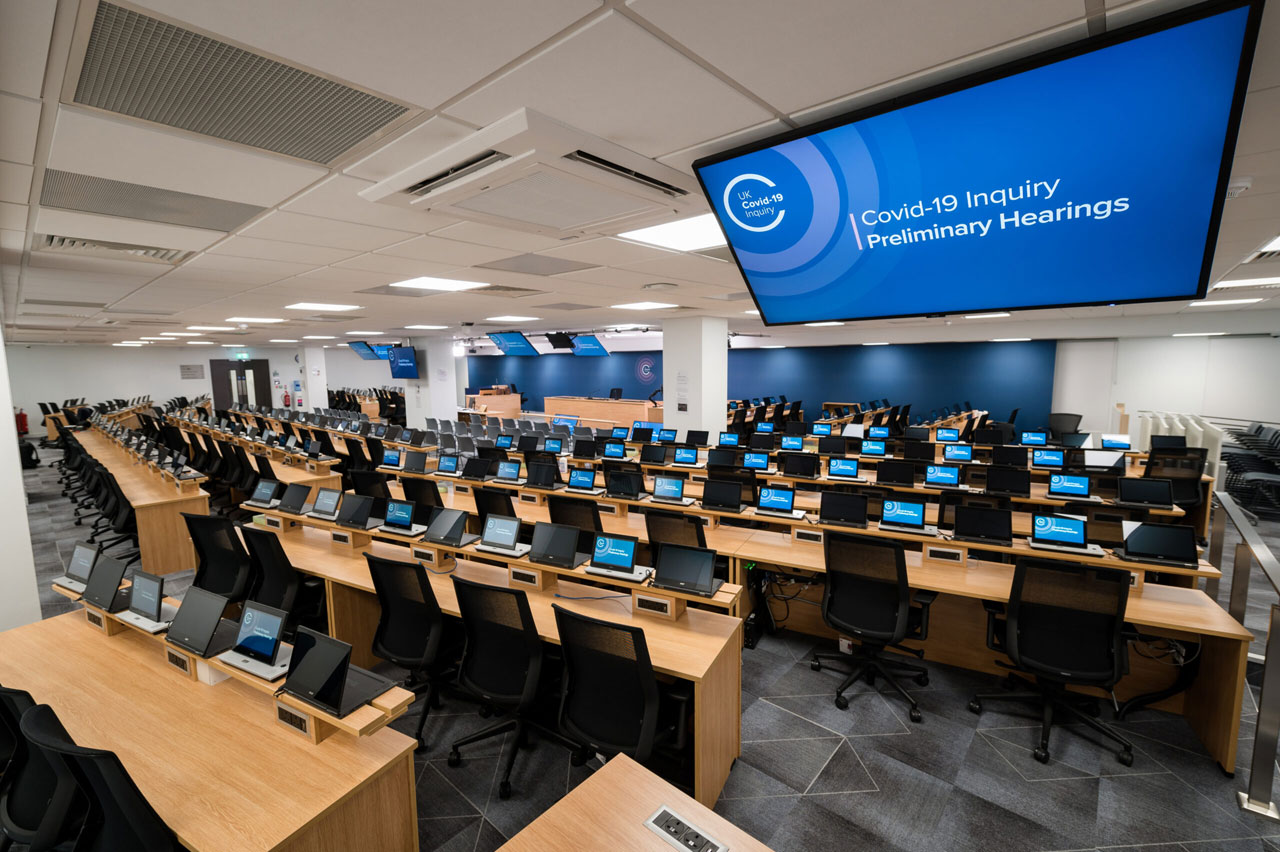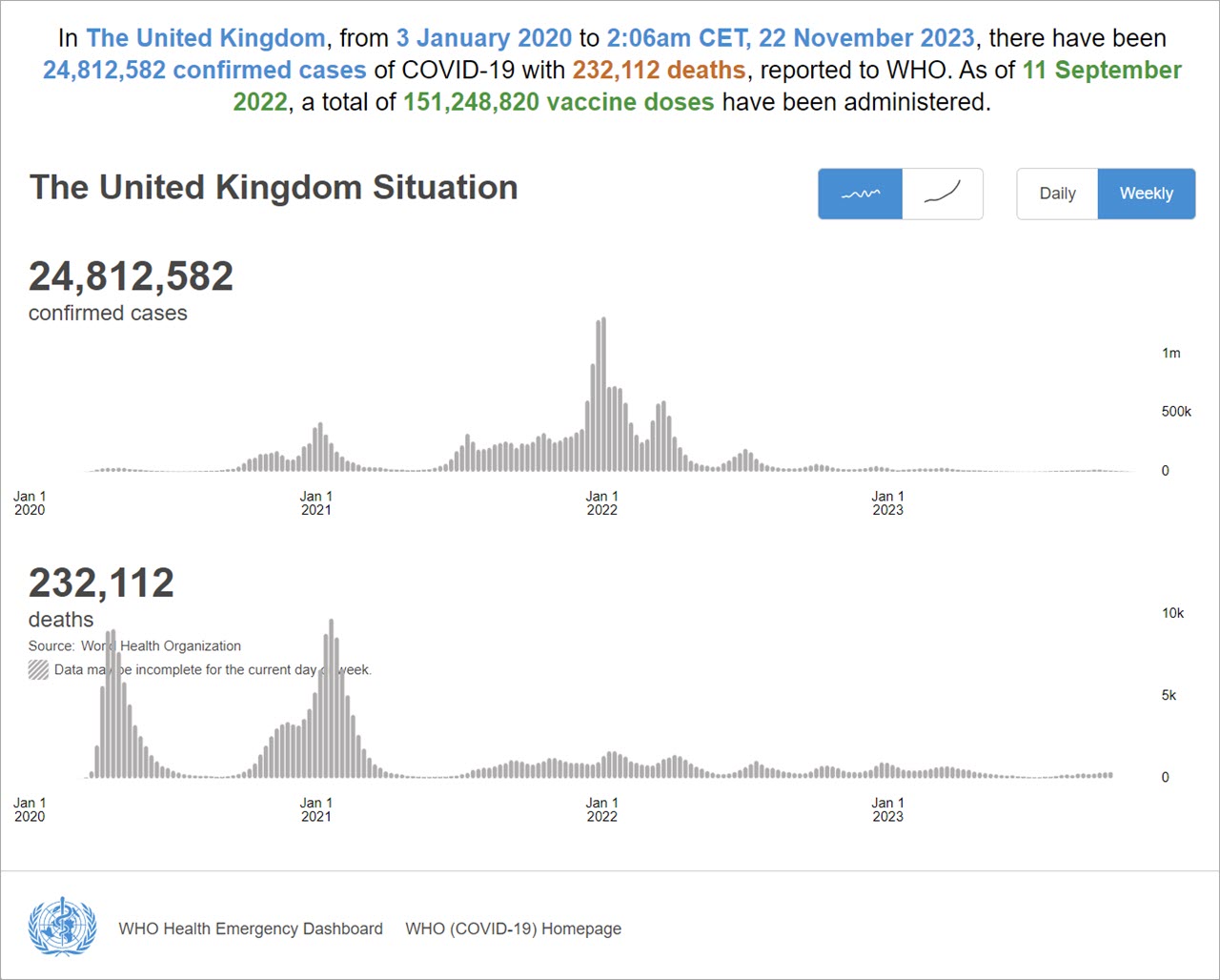
In the wake of the Covid-19 global health crisis in 2020-22 that reshaped our world, the United Kingdom has embarked on an ambitious and crucial endeavour: the Covid-19 public inquiry.
Announced in May 2021 by then Prime Minister Boris Johnson, this independent public inquiry delves into the UK government’s response to the coronavirus pandemic, aiming to unearth lessons for the future.
Led by Heather Hallett, a retired judge at the Court of Appeal, the inquiry scrutinises various aspects including the government’s preparedness, the implementation of lockdowns, and the management of healthcare systems across England, Wales, Scotland, and Northern Ireland??.
As public hearings began in June 2023, the inquiry turned into a focal point for understanding the interplay between government decisions and scientific advice. Anyone can attend the hearings at the hearings centre in West London.
The inquiry is divided into five modules, each dissecting different dimensions of the UK’s pandemic response:
- Resilience and preparedness
- Core UK decision-making and political governance
- Impact of the Covid-19 pandemic on healthcare systems in the four nations of the UK
- Vaccines and therapeutics
- Procurement
All of the modules are in various stages of investigation and hearing testimonies.
The inquiry is not only a retrospective analysis but also a critical examination of actions taken and not taken. It stands as a testament to the ongoing pursuit of transparency and accountability in a world grappling with the unforeseen challenges of a global pandemic.
Much of the testimony being given by people in or close to the central government is being televised live every day on TV news channels in the UK and worldwide (with live streaming and recordings available on YouTube).
What I have learned so far

First, I’d say that the demonstration of democracy in action evidenced by this public inquiry is in itself most remarkable. The fact is, whatever your role, position and status in government, public life and wider society, you will be required to be questioned in public about events and actions you were part of and a participant in. And you do this willingly and openly. That’s been the case so far.
Not only that, any citizen can voluntarily contribute to the inquiry’s investigations through the Every Story Matters project to help the public inquiry understand their experience of the pandemic.
What I saw in live TV broadcasts during the past week on the second module (overall timetable) has given me much pause for thought. Whilst hardly gripping viewing, it’s remarkable for the authenticity of the proceedings, the attention to every excruciating detail, and the openness and candour of each of those I’ve seen giving testimony as well as those asking the questions.
This retrospection has been helped by reviewing media coverage of the various testimonies, notably reporting by BBC News, ITV News, and Reuters.
Recent testimony from politicians like former Prime Minister (and current Foreign Secretary) David Cameron and last week from advisers to the government including Sir Patrick Vallance, Chief Scientific Adviser 2019-2023, and Professor Chris Whitty, Chief Medical Officer for England and Chief Medical Adviser since 2019, have shed light on the complexity of decision-making during unprecedented times??.
Perspectives:
- Boris Johnson’s Leadership: Sir Patrick Vallance criticised Boris Johnson’s understanding of scientific data and his leadership during the pandemic. Vallance’s private diaries, presented at the inquiry, describe Johnson as being “bamboozled” by statistics and fluctuating between optimism and pessimism about the severity of the disease. He also noted Johnson’s difficulty in grasping the concepts of relative and absolute risk??. At the same time, Vallance did note that most if not all political leaders in Europe were also bamboozled to a greater or lesser degree, citing the example where he was in a conference call with scientific advisers to other governments across Europe where laughter greeted one unnamed adviser’s account of the difficulty he had in helping his prime minister understand what an ‘exponential curve’ is.
- Cabinet Ministers’ Response: Vallance described Cabinet ministers as “meek as mice” and accused them of failing to impose recommended restrictions in the autumn of 2020 to curb the spread of Covid-19. There was criticism of Rishi Sunak, then the Chancellor of the Exchequer and now Prime Minister, for not consulting scientists before introducing the Eat Out to Help Out scheme, which was later criticised for contributing to the spread of the virus??.
- Indecision and Mismanagement: Vallance’s diaries also reflect on Johnson’s indecision, particularly when considering lockdown measures, where he appeared to be torn between letting the virus “rip” and closing the economy. Johnson’s approach was characterised as a lack of leadership??.
- Rishi Sunak’s Comments: A diary entry by Vallance, quoting former Special Adviser Dominic Cummings, alleged that Rishi Sunak suggested during a meeting that the government should “just let people die” rather than impose a second national lockdown. Sunak was also labelled “Doctor Death” by a government scientific adviser due to his “Eat Out to Help Out” policy??????.
- Overall Government Preparedness: Senior government officials admitted that the government was unprepared for the pandemic, and a “toxic” and “macho” culture hindered the response to the health crisis?.
While such criticisms are significant, it’s essential to consider that many of them are made with the benefit of hindsight – a truly wonderful thing. The complexities and uncertainties of the pandemic, particularly in its early stages, posed unprecedented challenges to decision-makers.
The inquiry aims to dissect these challenges and decisions to better prepare for future crises, but it’s crucial to remember that the context and knowledge available at the time influenced the actions taken.
This week, other key government figures from the time are due to give testimony. These include Michael Gove, Chancellor of the Duchy of Lancaster 2019-2021 (28 November), Dominic Raab, Deputy Prime Minister, Lord Chancellor and Secretary of State for Justice 2021-2023 (29 November), and Matt Hancock, Secretary of State for Health 2018-2021 (30 November and 1 December).
These might make for gripping viewing, especially Matt Hancock.
The public inquiry is expected to continue its investigative work and hear public testimony until 2026. Don’t hold your breath for substantive reporting – that will likely come much later.
Related reading:
- Jingle and Mingle should be the Tories’ epitaph (20 June 2023)
- Get a test kit for Covid self-testing (5 January 2022)
- Responses to Coronavirus (1 March 2020)
(Photo at top of the Hearings Centre in West London used with permission under the Open Government Licence v3.0)











